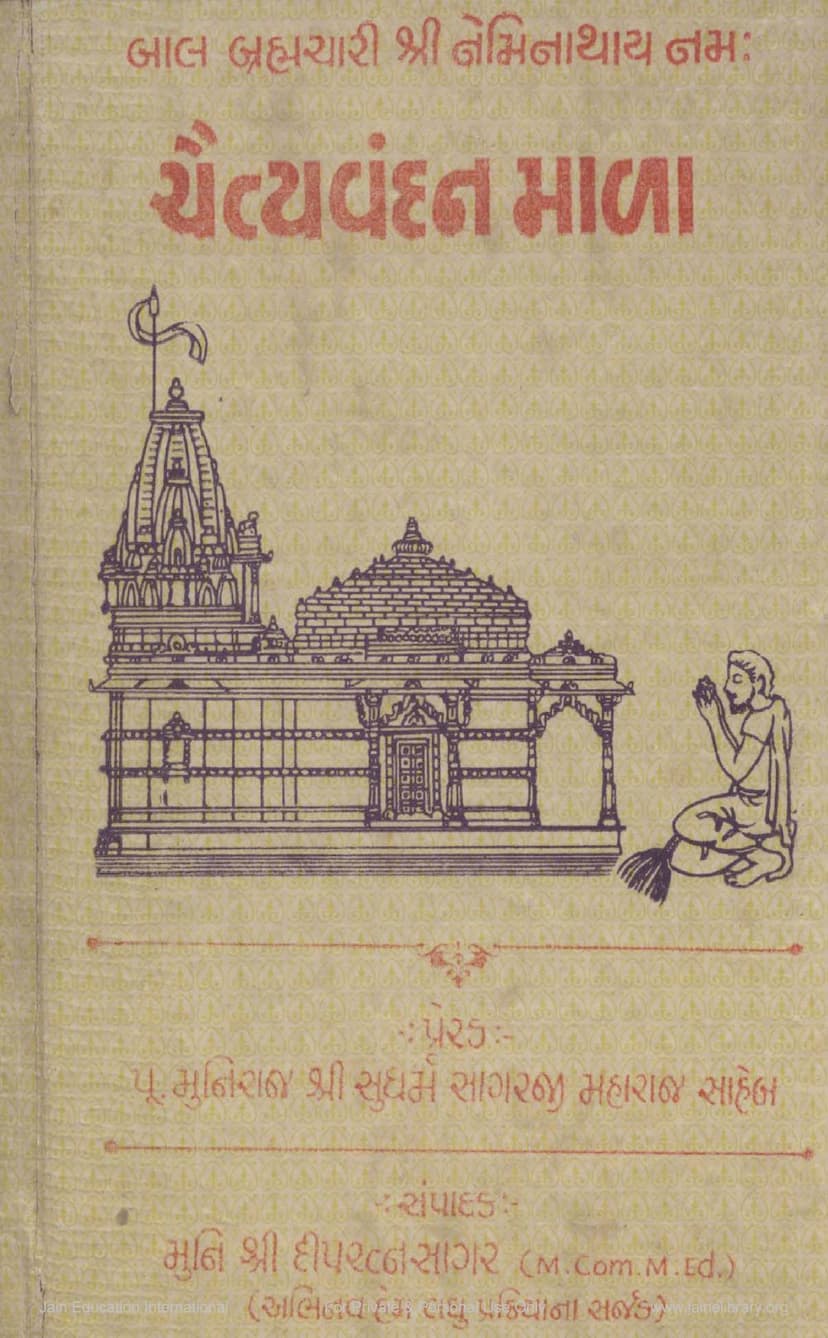Chaityavandan Mala
Added to library: September 1, 2025

Summary
This is a comprehensive summary of the Jain text "Chaityavandan Mala" authored by Dipratnasagar and Deepratnasagar, published by Deepratnasagar.
Title: Chaityavandan Mala (Collection of Chaityavandan)
Author(s): Muni Shri Dipratnasagar, Muni Shri Deepratnasagar
Publisher: Deepratnasagar
Catalog Link: https://jainqq.org/explore/005133/1
Core Purpose: The primary goal of "Chaityavandan Mala" is to provide a systematic and extensive collection of Jain Chaityavandans, which are devotional hymns or prayers performed in reverence to the Tirthankaras and other venerated beings in Jainism. The book aims to facilitate spiritual practice and foster devotion among Jain followers.
Key Features and Content:
-
Extensive Collection: The book is notable for its sheer volume, containing approximately 775 different Chaityavandans. This comprehensive compilation suggests a significant effort to gather a wide range of devotional verses.
-
Categorization: The Chaityavandans are organized into various categories for ease of access and understanding. These categories include:
- Specific Tirths (Holy Places): Chaityavandans dedicated to prominent Jain pilgrimage sites like Siddhachalam (Palitana), Samet Shikharji, Girnar, Abu, Ashtapad, etc.
- Specific Tirthankaras: Prayers dedicated to individual Tirthankaras such as Adinath, Shantinath, Neminath, Parshwanath, Mahavir Swami, and many others from the 24 Tirthankara lineage.
- Specific Tirthankara Life Events: Chaityavandans related to the Panch Kalyanakas (five auspicious events) of Tirthankaras (birth, initiation, knowledge, first sermon, and liberation).
- Tapasya (Austerities): Prayers associated with various Jain austerities like Rohini Tap, Vardhman Tap, Vish-Sthanak Tap, etc.
- Festivals and Observances: Chaityavandans for specific Jain festivals and auspicious days like Gyan Panchami, Maashi Chaudash, Diwali, Gautam Swami day, etc.
- Philosophical Concepts: Prayers related to fundamental Jain principles such as Navatattva (Nine Truths), Panch Parmeshthi (Five Supreme Beings), and Kars (passions).
- Tirthankara Attributes: Descriptions of Tirthankaras' physical attributes, lifespan, symbols (lanchana), divine powers (atishay), etc.
- Viharmans (Living Tirthankaras): Prayers for the Tirthankaras who are currently living in the world (Viharmans).
- Authorship: The index also indicates the authors of specific Chaityavandans, highlighting contributions from various monks and scholars within the Jain tradition.
-
Inspiration and Motivation: The preface (Prastavna) emphasizes the Jain goal of liberation from the cycle of birth and death (Samsara). It highlights devotion to the Vitragas (those who have conquered inner passions) as a path to achieve this goal, with Chaityavandan being a crucial form of lyrical devotion. The preface also stresses the importance of devotion to the entire monastic community (Sadhu-Sadhvi) rather than to specific individuals, promoting a broader sense of devotion to the Jain Dharma (Shasan).
-
Emphasis on Bhava Puja (Inner Devotion): The text underscores that while Dravya Puja (outer worship) is important for householders, Bhava Puja (inner devotion) is central for monks and nuns. Chaityavandan is presented as a key component of inner devotion.
-
Practical Utility: The compilation aims to be a practical resource for Jain practitioners, offering a wide array of devotional compositions that can be recited during various religious occasions and personal spiritual practices.
-
Acknowledgement of Donors: The book includes a detailed list of "Dravya Sahayaks" (financial contributors), showcasing the community support behind its publication. This list often includes names of individuals, families, Jain Sanghs (organizations), and trusts, indicating widespread backing for the project.
-
Language and Script: The book is primarily written in Gujarati, as indicated by the text snippets.
Overall Significance:
"Chaityavandan Mala" stands as a significant repository of Jain devotional literature. It serves as a valuable guide for monks, nuns, and lay followers seeking to deepen their spiritual connection through the practice of Chaityavandan. The extensive collection reflects the rich tradition of devotional poetry and hymnody within Jainism, offering a means to contemplate the virtues of the Tirthankaras and pursue spiritual growth. The work is dedicated to spiritual upliftment and the attainment of liberation, core tenets of Jain philosophy.